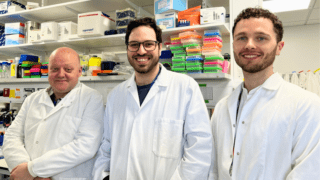Latest News
Search News
Categories
Archives
New insight into how a faulty protein drives lung cancer gives clues to why some therapies fail
15th June 2023
The findings could help explain why cancer drugs that target the molecule MET work for some people but not others.
Read moreResearchers shed light on the mystery of liver cells’ origins
30th May 2023
Understanding how new liver cells are created could inform how and why cell growth spirals out of control in cancer
Read moreSkin cancer rewires its energy systems to spread more efficiently
22nd May 2023
Melanoma cells rewire their mitochondria, but reversing this could make tumour cells less invasive.
Read moreScientists uncover a promising strategy to combat leukaemia resistance
18th May 2023
Research reveals a vulnerability in leukaemia cells that causes them to fill with toxic fatty acids
Read moreOvarian cancer’s protective barrier: how the tumour matrix teaches cells to disarm immune attack
15th May 2023
The results suggest new strategies to overcome the cancer’s defences and treat patients more effectively
Read moreWelcoming Professor Francesca Ciccarelli to the BCI
24th April 2023
Professor Francesca Ciccarelli will be joining Barts Cancer Institute to lead our Centre for Cancer Genomics & Computational Biology.
Read more





